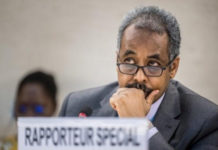The Guardian: I am a refugee in a Libyan camp. Conditions are so bad, people are dying – 8 November
- The Guardian publishes a piece written by an Eritrean refugee currently detained in Libya about the dire conditions and abuse he and others face at detention centres in the country.
- Writing from Tripoli, Thomas Issak (a pseudonym) explains that Eritreans, Somalis and Sudanese fear returning home but remain trapped in Libyan camps, where abuse is rife, hygiene products and medical supplies are limited, and infectious diseases spread.
- He says that the UNHCR and the IOM are aware that such supplies – including much needed hygiene products and blankets – are resold by Libyan guards and refugees, but do not act on it. Many detainees rely on their families’ financial support through black market routes.
- He writes: “All the while the Libyans who are supposed to look after us are thinking only about how to get more money from UNHCR. They make films, they lie, they pretend they’re managing, helping the refugees. When they know white people will come they clean up, hide the people who are in a bad condition and those they have beaten.”
Voice Of America: Parents’ Journey Inspired US Congress’ 1st Eritrean-American – 08 November
- Voice of America reports on the election to US Congress of Democrat candidate Joe Neguse, the country’s first Eritrean-American politician. He will represent around 720,000 Coloradans in a district that covers about 10 counties.
- Mr Neguse’s politics are born out of his family history, and he values the sacrifices and courage of his parents, Debesai and Azeib, who emigrated and rebuilt their lives in the US when they fled the war with Ethiopia in the early 1980s.
- In a campaign video, Mr Neguse said “I’m not a typical candidate. […] As the son of immigrants, as the son of refugees who came to this country, I firmly believe that we are a country rooted in the values of empathy and compassion for people who are coming to the United States to rebuild their shattered lives.”
- In his victory speech, Mr Neguse emphasised his focus on the values of diversity and inclusion, and said: “We are living in trying times, which demands the very best of ourselves in order to combat the toxicity and the vitriol and the strife so common today.”
The Nation: Ethiopia and Eritrea Need Their Peace – 8 November
- The Nation publishes an opinion article about the situation between Eritrea and Ethiopia, and the wider impact on stability in the Horn of Africa region.
- Gérard Prunier, a member of the Atlantic Council, surmises that the Eritrean regime anticipates the lifting of sanctions that Isaias will not have to “loosen his grip on his country to please the international community.”
- Prunier writes that for Tigrayans in Eritrea, the reconciliation could allow the resumption of trade, which has been blocked for nearly 20 years, while compulsory indefinite military service could be abolished – but also that reconciliation efforts may amount to “diplomatic cover for the continuation of a rigid dictatorship”.
Anadolu Agency: Horn of Africa trio meet for 2nd time since September – 9 November
- Anadolu Agency reports on the second meeting between the leaders of Ethiopia, Somalia and Eritrea, held in Amhara on Friday.
- The three leaders are said to be discussing the terms of future social and economic cooperation, and ways to strengthen peace and security for the Horn of Africa region.
- News of further reconciliatory developments between Eritrea and Djibouti has emerged, as Ethiopian Prime Minister Abiy Ahmed seeks to intervene.
- Other media outlets including Africa News, Addis Standard and Borkena also reported on this news story.
Eritrea Hub: Ethiopia has plans for naval bases – but will Eritreans be consulted? – 9 November
- Eritrea Hub publishes an analysis of Ethiopia’s plans to build a naval base “adjacent to the Red Sea & the Indian Ocean.”
- General Berhanu Jula, Deputy Chief of Staff of the Ethiopian Armed Forces, said that Ethiopia is “consulting with other countries regarding the naval reinstatement, capacity and structure”.
- There are concerns that such major developments in the region could be implemented without the Eritrean people’s ability to have their say – through democratic representation – on a matter which would reduce their sovereignty.
- Ethiopia’s access to international waters relies on use of other countries’ naval bases. In the past, bases in Kenya, Somaliland or Djibouti have been considered, but since July Eritrea’s ports have been viewed as a more advantageous option.







